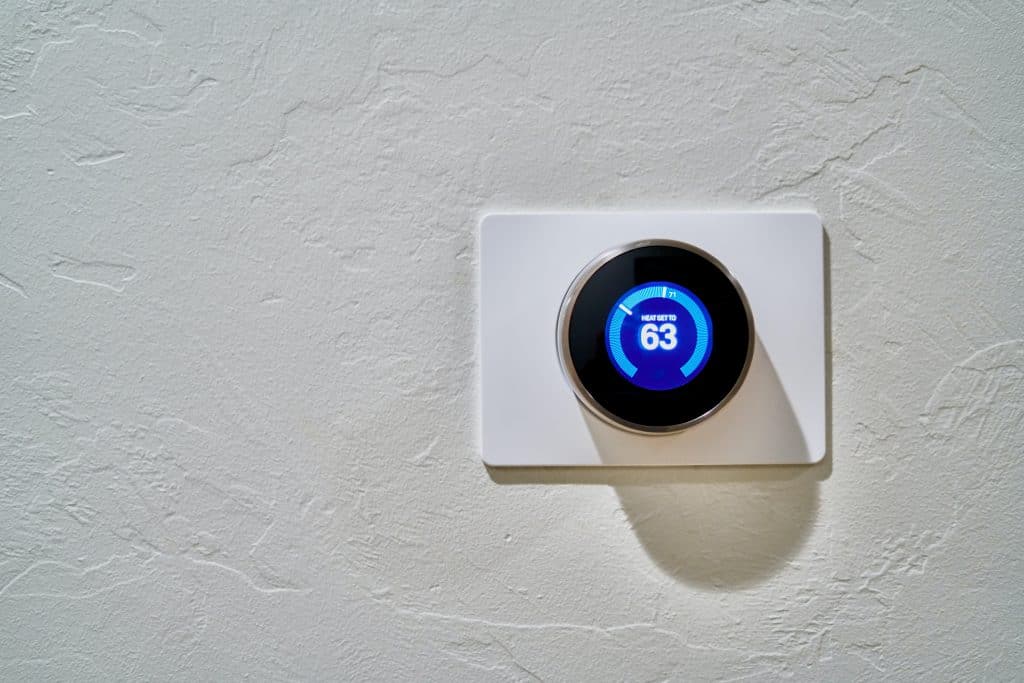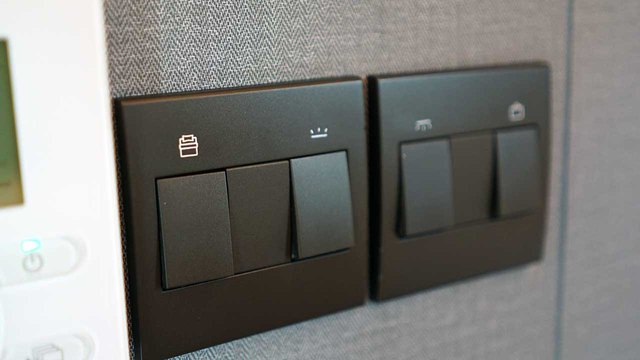A dimmer switcher is used for power control. It's a variable resistor that is used to lower the voltage and current going to a lightbulb. What causes this heat build-up? Let`s sort it out together!
Why do dimmer switches get warm?
Dimmer switches work by lowering the voltage that goes to a lightbulb. This lowers the amount of current flowing through the lightbulb, and as a result, the lightbulb produces less light. The heat buildup in dimmer switches is caused by two things: resistance and power dissipation.
A dimmer switch is required to adjust the brightness of your lightbulbs immediately. A transistor-like semiconductor is used in modern dimmer switches to regulate the current entering your lights. The dimmer box is where heat builds up, and metal heat sinks are used to counteract it. The plates on older dimmer switches become heated when the light is dimmed, whereas the caps of new switches get hot when lighting is increased.
The old dimmers were not as energy-efficient as the new models. The new models are very efficient because they don`t have to work as hard. However, some people do not like the idea of newer, more energy-efficient dimmer switches because they can get quite hot.
As the current flowing through the dimmer switch is lowered, the resistance of the switch increases. This increase in resistance causes more heat to be generated within the switch. In addition, any power that is not being used to produce light is dissipated as heat within the switch.
So, if you notice your dimmer switch getting warm, don't worry! It's just doing its job.
Is it dangerous for a dimmer switcher to get hot?
The most typical reason your dimmer switch becomes hot to the touch is that it's overloaded. The switch regulates a high current that is beyond the electricity rating of the switch, causing a significant amount of heat to be trapped.
If you have an old, outdated dimmer switch, it may be less energy-efficient and cause more heat to build up. While this isn't necessarily dangerous, it can reduce the lifespan of your switch. If you're concerned about the heat build-up in your dimmer switch, consider upgrading to a newer model. Newer models are designed to dissipate heat more effectively and prevent overloads.
In conclusion, don`t be alarmed if you notice your dimmer switch getting warm. It's usually nothing to worry about. However, if you're concerned about the heat build-up, consider upgrading to a newer model.
Why does it get hot when turned off?
What if you switch off your dimmer and it's still hot to the touch after? The internal heat of overloaded switches is exceeding the manufacturer's design specifications.
This can be caused by multiple factors, the most common being that the switch is handling more power than it's rated for. If you're repeatedly turning your lights on and off, this can also cause heat build-up as the switch doesn't have time to cool down between uses.

If you notice your dimmer switch is excessively hot even when turned off, stop using it immediately and consult an electrician. Excessive heat build-up can lead to fire hazards. Although it may seem unimportant, you should double-check that the dimmer is completely turned off before making this evaluation. When a modern switch is fully switched off, it makes a click sound (particularly with switches only responsible for one bulb).
Another cause is incorrect wiring, which is supplying power to the switch. This might be due to improper installation or just the age of the circuit. While it's unusual for a dimmer switch to retain so much heat when off, if you're unsure about the safety of your switch, please consult an electrician.
In short, if you notice your dimmer switch is excessively hot even when turned off, there may be an underlying issue that needs to be addressed. Consult an electrician if you're concerned about the safety of your switch. In conclusion, if you notice your dimmer switch is excessively hot, even when turned off, stop using it immediately and consult an electrician. Excessive heat build-up can lead to fire hazards.
Will it lead to a fire hazard or burn-out?
If the combined wattage of all connected bulbs exceeds your dimmer switch's wattage rating, you could burn out the device. If the switch is getting hot to the touch, it's likely overloaded. Consider removing some bulbs or upgrading to a higher wattage rating.
In addition, if you have an old, outdated dimmer switch, it may be less energy-efficient and cause more heat to build up. While this isn't necessarily dangerous, it can reduce the lifespan of your switch. If you're concerned about the heat build-up in your dimmer switch, consider upgrading to a newer model. Newer models are designed to dissipate heat more effectively and prevent overloads.
The plastic mounting on the wall may melt at temperatures of over 90°C, which will be bad for the circuit's integrity. If you detect burning or scorched plastic, you must act right away. A heated dimmer switch is typical in circuits that are heavily loaded, such as a chandelier with numerous bulbs.
To summarise, if you notice your dimmer switch getting warm, don't worry! It's just doing its job. However, if you're concerned about the heat build-up, consider upgrading to a newer model.
What about if my lights are flickering?
If your lights are flickering, it could be a sign that your dimmer switch is overloaded. The switch regulates a high current that is beyond the electricity rating of the switch, causing a significant amount of heat to be trapped. This can cause the switch to malfunction and your lights to flicker.
It's important to have an electrician check your dimmer switch if you notice any flickering, as it could be a sign of a more serious issue.
Why do light switches glow?
If you notice your light switch glowing, it's likely due to a loose wire. A loose wire in the switch can cause an electrical current to pass through the switch, which in turn causes the switch to heat up and glow.
If you notice your light switch glowing, you should consult an electrician as soon as possible. A loose wire in the switch can be a fire hazard. In conclusion, if you notice your light switch glowing, don't ignore it! Consult an electrician as soon as possible, as it could be a sign of a fire hazard.
Do smart switches get warm?
Because most smart switches get hot and are designed for copper wiring, you should avoid placing these fixtures in any location that is known to be aluminum wired.
While it is normal for a smart switch to generate heat, if you notice that the faceplate is excessively hot, there may be an issue with the wiring. Consult an electrician to check your wiring and ensure that everything is safe.
In short, yes, smart switches can get warm, but if you notice that the faceplate is excessively hot, there may be an issue with the wiring. Consult an electrician to check your wiring and ensure that everything is safe. However, if your smart switch is getting hot to the touch, it's likely overloaded. Consider removing some bulbs or upgrading to a higher wattage rating.
What do I do if my light switch is hot?
If you're having trouble with a hot light switch, you'll need an electrician right now. Replacing a light switch is a straightforward and cheap remedy, as long as you hire an expert. In no time, a competent electrician should be able to replace or improve your light switch.

Dimmer switches get hot because they are regulating a large amount of current. The heat is caused by the resistance of the switch, which creates heat as the current passes through it. The heat is usually not a cause for concern, but if you notice your dimmer switch is excessively hot, even when turned off, you should consult an electrician. Excessive heat build-up can lead to fire hazards.
If you're concerned about the heat build-up in your dimmer switch, consider upgrading to a newer model. Newer models are designed to dissipate heat more effectively and prevent overloads.
Does higher wattage affect switch cooling?
The wattage of your light sources also has an impact on a dimmer switch's temperature. More powerful light sources require more energy to operate, which causes the switch to work harder and get hotter.
While this may not be a problem for most dimmer switches, it's something to keep in mind if you're using high-wattage bulbs. If you notice your switch getting excessively hot, consider switching to lower wattage bulbs. This will help reduce the amount of heat build-up in your switch.
In case you control the light bulbs with a single dimmer switch, the switch must handle the combined wattage of all the bulbs. This can lead to an overabundance of heat and overload on the dimmer switch, which could be dangerous. Still, you can take some precautions to ensure that your electrical system's wattage stays correct. This may harm both the switch and its connected light sources, necessitating their replacement.
In conclusion, dimmer switches can get hot for multiple reasons. The most common cause is that the switch is handling more power than it's rated for. If you're concerned about the heat build-up in your dimmer switch, consider upgrading to a newer model. Newer models are designed to dissipate heat more effectively and prevent overloads.
In addition, make sure you're not exceeding the wattage rating of your switch by using high wattage bulbs. If you notice your switch getting excessively hot, consider switching to lower wattage bulbs. This will help reduce the amount of heat build-up in your switch.
Safety precautions with dimmer switches
As we've seen, dimmer switches can get hot, but this is usually not a cause for concern. However, if you notice your dimmer switch is excessively hot, even when turned off, you should consult an electrician. Excessive heat build-up can lead to fire hazards.
In addition, make sure you're not exceeding the wattage rating of your switch by using high wattage bulbs. If you notice your switch getting excessively hot, consider switching to lower wattage bulbs. This will help reduce the amount of heat build-up in your switch.
Finally, if you control the light bulbs with a single dimmer switch, the switch must handle the combined wattage of all the bulbs. This can lead to an overabundance of heat and overload on the dimmer switch, which could be dangerous. Still, you can take some precautions to ensure that your electrical system's wattage stays correct. This may harm both the switch and its connected light sources, necessitating their replacement.
In conclusion, follow these safety tips to avoid any problems with your dimmer switch:
- If you notice your dimmer switch is excessively hot, even when turned off, consult an electrician.
- Make sure you're not exceeding the wattage rating of your switch by using high wattage bulbs. If you notice your switch getting excessively hot, consider switching to lower wattage bulbs.
- If you control the light bulbs with a single dimmer switch, the switch must handle the combined wattage of all the bulbs. If this causes an overabundance of heat and overload on the dimmer switch, be sure to take some precautions to ensure that your electrical system's wattage stays correct.